AutoTrader data shows shift toward economy in Canadians’ vehicle choices

Image courtesy of AutoTrader.
By subscribing, you agree to receive communications from Auto Remarketing and our partners in accordance with our Privacy Policy. We may share your information with select partners and sponsors who may contact you about their products and services. You may unsubscribe at any time.
Canadians seem to be feeling squeezed by economic pressures when it comes to their vehicles.
AutoTrader’s year-end data on the most searched for and most sold vehicles on its platform shows Canadian consumers choosing vehicles that prioritize affordability, reliability and utility over luxury and aspirational vehicles.
With vehicle inventory on the AutoTrader marketplace reaching record highs in 2024, the company said luxury brands dropped to their smallest representation in both searches and sales since 2019 as consumer interest showed a shift toward practical mainstream models.
For the second consecutive year, there were no luxury models among the top 10 sold vehicles, while lower-priced models like the Toyota Corolla, Ford Escape, Hyundai Elantra and Hyundai Tucson were new additions to that list.
“Each year, AutoTrader analyzes millions of data points to uncover the evolving story of Canadian vehicle shopping behaviors,” chief marketing officer Ian MacDonald said. “This year, the data clearly points to a shift away from luxury vehicles across most of the country, underscoring the reality that many Canadian consumers are watchfully navigating a challenging economic landscape.”
That said, many Canadians still seem to be dreaming big, as half of the top 10 searches are for higher-end vehicles and sports cars: the BMW 3 Series, Porsche 911, Ford Mustang, Mercedes-Benz C Class and Chevrolet Corvette all made the list.
Subscribe to Auto Remarketing to stay informed and stay ahead.
By subscribing, you agree to receive communications from Auto Remarketing and our partners in accordance with our Privacy Policy. We may share your information with select partners and sponsors who may contact you about their products and services. You may unsubscribe at any time.
Not surprisingly, Ford F-150 and Toyota RAV4 ranked first and second on both the top searched and top sold lists, with Honda’s Civic and CR-V also appearing on both. The Civic was third among searches and fifth among sales, while the CR-V was third in sales and eighth in searches.
Though down slightly, cars remain the most popular vehicle segment in AutoTrader’s searches, accounting for 49%, down from 51% in 2023. SUVs’ share of the searches rose two percentage points to 40%, and the segment also took five spots on the top sold vehicles list. Trucks accounted for 10% of all vehicle searches in 2024, virtually unchanged from the previous year, but only two – the F-150 and RAM 1500 – made the top sold list, half the number in 2023.
Electric vehicles searches rose by 9% this year but are still just 8% of the site’s total search volume. A March study by AutoTrader showed 46% of non-EV owners said they were open to buying an EV in 2024 (down from 56% 2023 and 68% in 2022), which the company said illustrates “a clear gap between interest and actual purchase intent.”
While purchase intent for EVs is slowing, interest in hybrids is on the rise. AutoTrader said 62% of EV intenders are now considering hybrid electric vehicles and 60% are considering plug-in hybrids. Both of those numbers surpassed the 50% of battery electric vehicles.
Broken down its data by province, AutoTrader’s data found Ontario’s searches a greater mix of luxury sedans, performance cars and SUVs than the other provinces, with fewer trucks. British Columbia’s top searched list, on the other hand, reflects what AutoTrader called “a noticeable shift” away from luxury vehicles, with the Mercedes-Benz E-Class and C-Class dropping off the list from last year.
Quebec vehicle shoppers showed a preference for economical options, with the Honda Civic retaining its No. 1 spot, while trucks were dominant in Saskatchewan and Alberta, accounting for 60% of all vehicle searches in Saskatchewan and 50% in Alberta.
AutoTrader also explored how Canadians are navigating the complexities of the current economic environment and found demand holding steady amid increased inventory and moderate shifts in pricing. According to data from research conducted in August, 27% of consumers were planning to buy a vehicle in the next six months, up from 26% in 2023.
Even with interest rates and gas prices down and inventory shortages eased, price is still a key consideration for most buyers, with 84% saying high vehicle prices are influencing their purchase decisions. But Canadians are feeling more optimistic about their financial outlook, with 53% believing their finances will improve over the next six months, up from 45% the previous year.
Cross-shopping between new and used vehicles is common, as 47% of used-car buyers considered new vehicles and 36% new-car buyers exploring used options.


